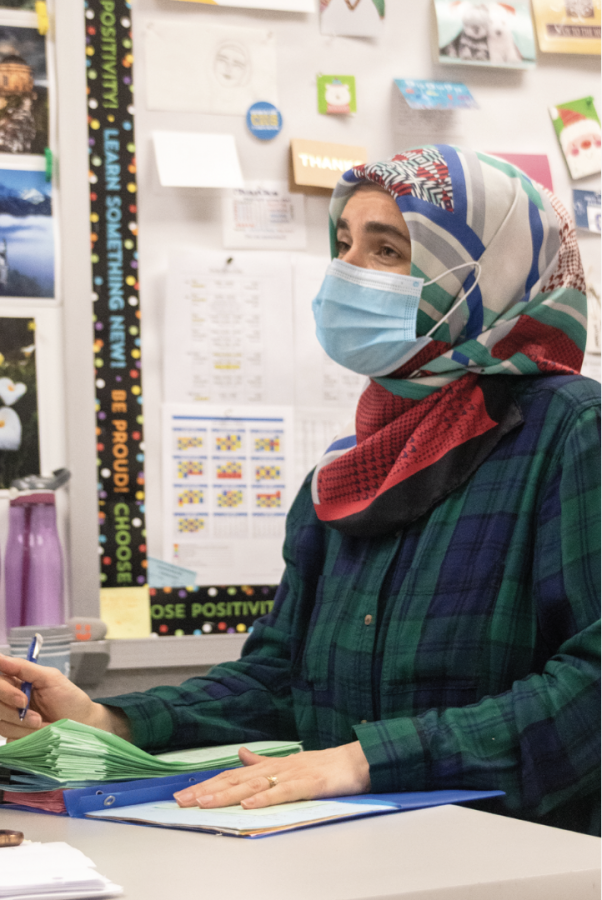After a year of hybrid and virtual learning, affecting many school operations, administration announced there will be no formal finals week this school year with “final exams” being weighted no more than typical tests.
Junior Amna Mallick, who has not experienced a finals week since the first semester of her freshman year, said she likes the idea, but believes there might be potential drawbacks to the change.
“I think (a typical finals week) better prepares you for college because most colleges still have a formal finals week,” Mallick said, “but I know (administration) is trying to take student’s mental health into account more, which I appreciate.”
However, senior Rida Jawad said she doesn’t see many drawbacks to these new adaptations.
“I can’t think of a reason people wouldn’t like it. At some point, you have to ask, what’s the point of (having finals),” Jawad said.
Because finals are optional this year, math teacher Kristina Hunt said she will not give a cumulative final to her classes this semester.
“(As a teacher,) it’s important to ask yourself, why are we giving this test? And while there’s value in trying to prepare kids for exams in college, I think we need to be paying more attention to the here and now of what’s happening in our classes to weigh what content we think is more important,” she said.
Jawad said she supports these changes and believes the new schedule will benefit students and teachers.
“After being in hybrid for a year from COVID, people weren’t in much of a school routine, so easing back into it makes the whole process a lot less stressful for everyone,” she said.
Hunt agreed, but understands why some classes would still give finals this year despite the new schedule.
“It doesn’t really make a difference in students’ grades,” Hunt said. “If a student is averaging an A or B in the class they tend to score in that range on the final, and the same for lower scoring students. If we aren’t learning new information from presenting a final to students who still need to resituate themselves in a school setting, we’re not being productive.”
“I definitely like (the idea of) this new plan,” Mallick said. “I’d prefer to have time to work on projects to develop my grade, even if I might have scored better or worse on a final, just because I know I put my best effort into my (long term work).”


































![AI in films like "The Brutalist" is convenient, but shouldn’t take priority [opinion]](https://hilite.org/wp-content/uploads/2025/02/catherine-cover-1200x471.jpg)









































![Review: “The Immortal Soul Salvage Yard:” A criminally underrated poetry collection [MUSE]](https://hilite.org/wp-content/uploads/2025/03/71cju6TvqmL._AC_UF10001000_QL80_.jpg)
![Review: "Dog Man" is Unapologetically Chaotic [MUSE]](https://hilite.org/wp-content/uploads/2025/03/dogman-1200x700.jpg)
![Review: "Ne Zha 2": The WeChat family reunion I didn’t know I needed [MUSE]](https://hilite.org/wp-content/uploads/2025/03/unnamed-4.png)
![Review in Print: Maripaz Villar brings a delightfully unique style to the world of WEBTOON [MUSE]](https://hilite.org/wp-content/uploads/2023/12/maripazcover-1200x960.jpg)
![Review: “The Sword of Kaigen” is a masterpiece [MUSE]](https://hilite.org/wp-content/uploads/2023/11/Screenshot-2023-11-26-201051.png)
![Review: Gateron Oil Kings, great linear switches, okay price [MUSE]](https://hilite.org/wp-content/uploads/2023/11/Screenshot-2023-11-26-200553.png)
![Review: “A Haunting in Venice” is a significant improvement from other Agatha Christie adaptations [MUSE]](https://hilite.org/wp-content/uploads/2023/11/e7ee2938a6d422669771bce6d8088521.jpg)
![Review: A Thanksgiving story from elementary school, still just as interesting [MUSE]](https://hilite.org/wp-content/uploads/2023/11/Screenshot-2023-11-26-195514-987x1200.png)
![Review: "When I Fly Towards You", cute, uplifting youth drama [MUSE]](https://hilite.org/wp-content/uploads/2023/09/When-I-Fly-Towards-You-Chinese-drama.png)
![Postcards from Muse: Hawaii Travel Diary [MUSE]](https://hilite.org/wp-content/uploads/2023/09/My-project-1-1200x1200.jpg)
![Review: "Ladybug & Cat Noir: The Movie," departure from original show [MUSE]](https://hilite.org/wp-content/uploads/2023/09/Ladybug__Cat_Noir_-_The_Movie_poster.jpg)
![Review in Print: "Hidden Love" is the cute, uplifting drama everyone needs [MUSE]](https://hilite.org/wp-content/uploads/2023/09/hiddenlovecover-e1693597208225-1030x1200.png)
![Review in Print: "Heartstopper" is the heartwarming queer romance we all need [MUSE]](https://hilite.org/wp-content/uploads/2023/08/museheartstoppercover-1200x654.png)




